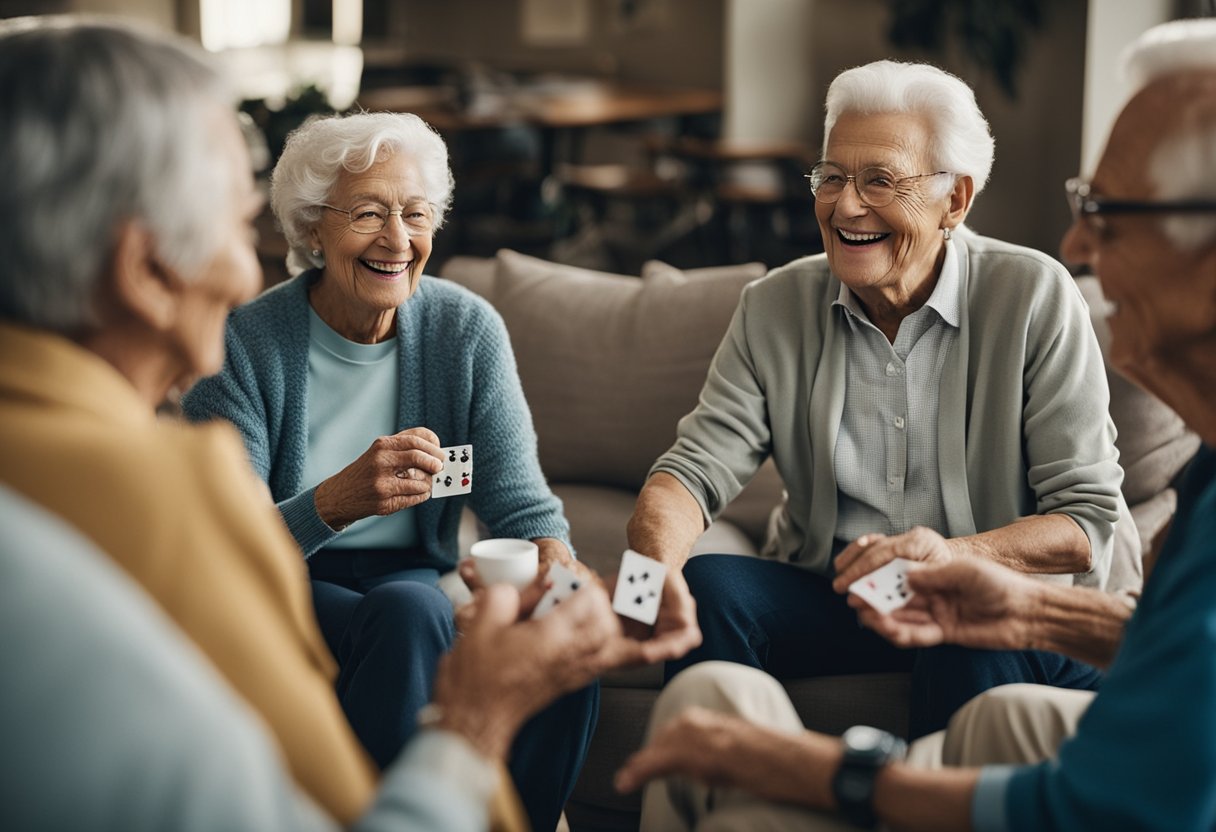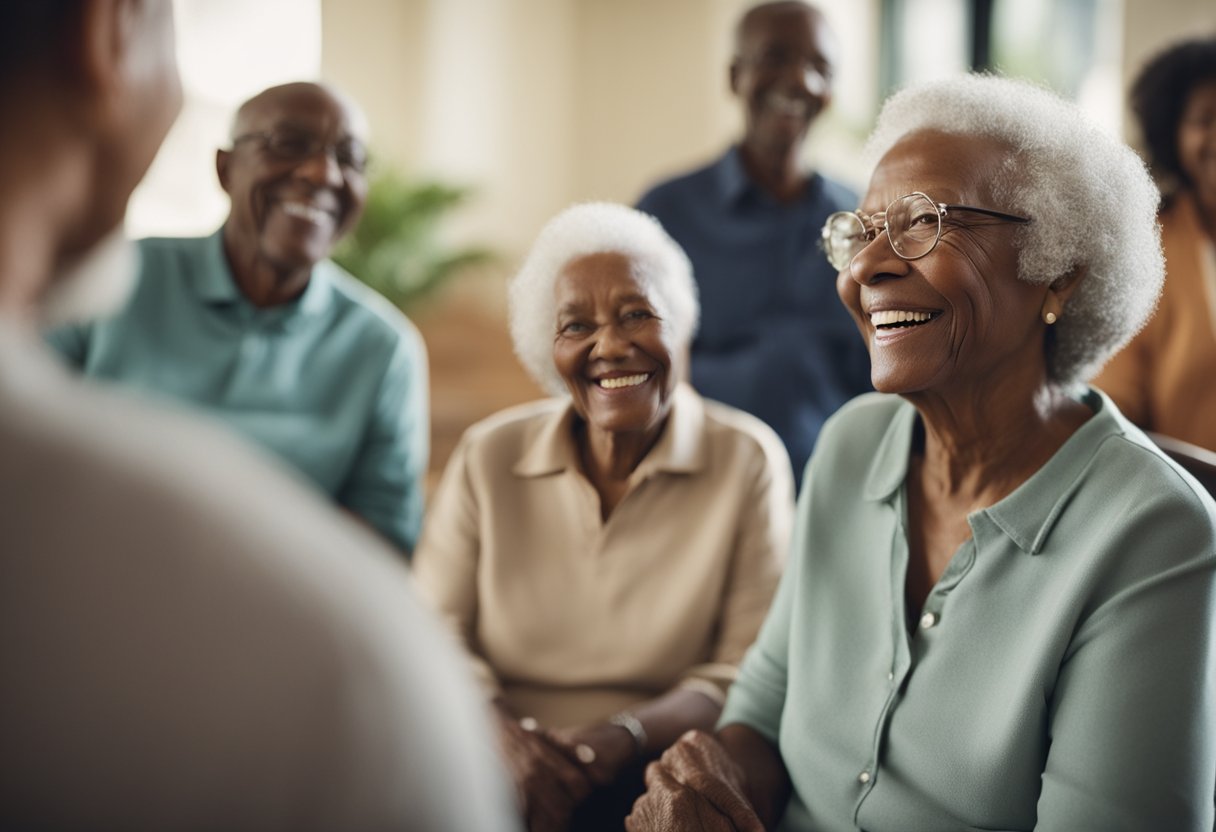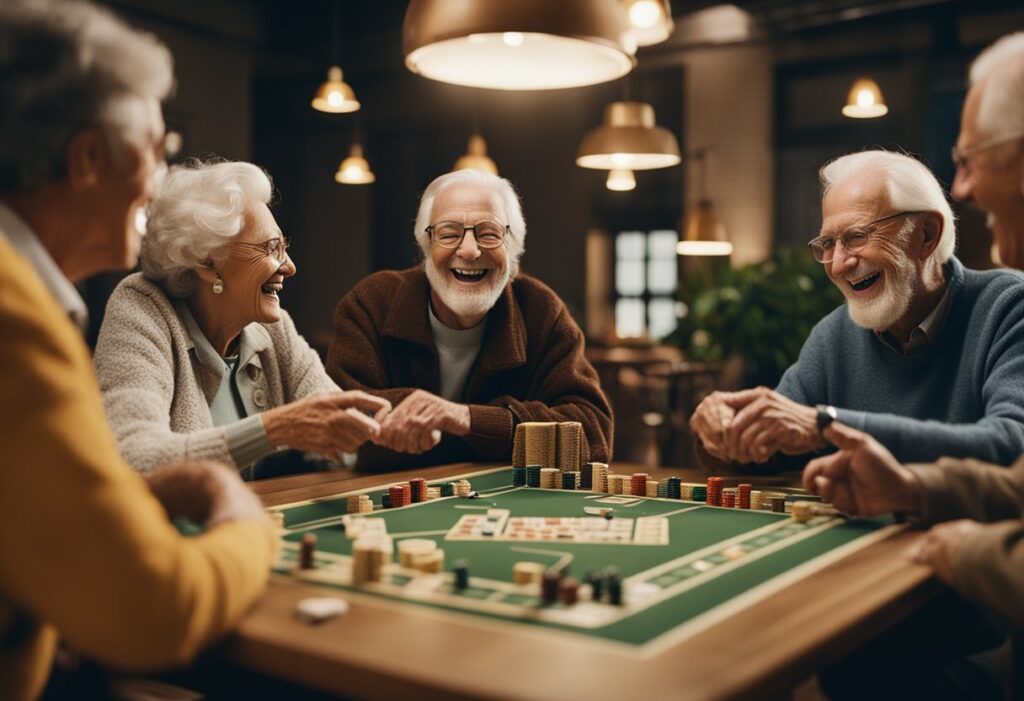Adopting a proactive approach to building friendships can significantly enhance your well-being. Embracing hobbies, learning new skills, and leveraging technology for socialization can lead you to form meaningful relationships. Participating in group activities not only keeps you engaged but also provides a sense of community that is fundamental at any stage of life.
Key Takeaways
- Social connections improve well-being and are achievable at any age.
- Community centers and events are valuable venues for meeting peers.
- Embracing technology expands your social network beyond physical boundaries.
Understanding the Importance of Social Connections
Establishing strong social connections can significantly enhance your quality of life as a senior citizen, influencing both your physical and mental health, and helping you combat loneliness and social isolation.
Physical and Mental Health Benefits
Physical Health: Your physical well-being is often directly linked to the quality of your social interactions. Regular engagement with friends can lead to a more active lifestyle, potentially reducing your risk of heart disease. Additionally, being socially active encourages mobility, which is crucial for maintaining physical health in your senior years.
Mental Health: Positive social connections are a protective factor against mental health issues. Through friendships, you can experience improved feelings of well-being and a significant decrease in feelings of depression. Moreover, staying socially engaged can help lower your risk of dementia by keeping your mind active and stimulated.
Overcoming Loneliness and Social Isolation
Loneliness and social isolation can affect your life more intensely as you age. Recognizing the signs and taking steps to build social networks can help mitigate these feelings. Participating in community activities or leveraging technology to maintain contact with loved ones can be effective in breaking the cycle of isolation. Remember, it’s never too late to forge new friendships and reconnect with old acquaintances; doing so is critical for your emotional health.
The Role of Friendship in Healthy Aging
Friendships play an integral role in healthy aging. Solid social support can lead to improved coping strategies in times of stress and provide a sense of belonging and purpose. As a senior citizen, nurturing relationships can contribute to a longer, happier, and more fulfilled life. It’s essential to prioritize these connections to reap the full benefits they offer.
Getting Involved in Community Activities
In your golden years, becoming a part of the community fabric through activities and social engagement can lead to enriching friendships and a sense of belonging.
Senior Centers and Available Resources
Senior centers are a cornerstone for community engagement. They typically offer a variety of resources, from fitness classes to art workshops, which can be the perfect venues for meeting new people. Check your local senior center for a calendar of events, and consider joining programs that appeal to your interests. For example, joining a community gardening club can help you connect with like-minded individuals while nurturing your green thumb.
Volunteering and Contributing to the Community
Contributing your time as a volunteer can be immensely rewarding and a powerful way to forge connections. Local soup kitchens, animal shelters, or community groups often seek volunteers. Not only does volunteering allow you to give back, but it also introduces you to others who share your compassionate values.
Joining Clubs and Interest Groups
Exploring interests through clubs can lead to lasting friendships. Whether it’s a book club, a crafting group, or a fishing club, these interest-based gatherings bring people together. Find clubs in your neighborhood or start your own. Engaging in conversations about shared hobbies in a social group setting often leads to meaningful connections.
Participating in Local Community Events
Look out for local community events, such as cultural festivals, holiday celebrations, or charity fundraisers. These public gatherings are perfect opportunities to meet neighbors and involve yourself in community traditions. By being an active participant, you not only enjoy the events but also become a familiar face in the community.
Pursuing Hobbies and Interests
Developing friendships as a senior citizen often centers around sharing common interests. Engaging in hobbies and joining groups focused on these activities provide excellent platforms to connect with others. Consider the following:
Exercise and Sports: If you’re keen on staying active, look for local exercise classes or sports clubs that cater to seniors. Yoga, golf, and even dance classes are great for meeting people, and you benefit from the added advantage of improved physical health.
Classes and Education: Have a love for learning? Enroll in a class. Whether it’s a cooking workshop, a history lecture at a museum, or language lessons, educational environments naturally foster social interaction.
Creative and Relaxing Activities: Crafts like knitting offer a serene way to connect with others. Sharing patterns or projects with fellow enthusiasts can build lasting friendships. Similarly, gardening brings together fans of flora through local clubs or community gardens.
Book Clubs and Reading Groups: Joining a book club is an easy way to find like-minded individuals. Discussions about literature can trigger meaningful conversations and deeper connections.
Groups On the Move: Travel groups offer opportunities to explore new places together. Whether it’s a day trip or an extended journey, the shared experiences can form strong bonds among participants.
Social Exercise Outlets: Gyms often provide classes specifically for seniors where you can both exercise and socialize. Likewise, walking or hiking clubs combine the joys of nature with the company of others.
Remember, the key to making new friends through hobbies and interests is to remain open to new experiences and engage with the communities you join. Your willingness to participate and share with others is the first step toward building valuable friendships.
Adopting Technology for Socialization
Embracing technology to facilitate your social interactions can be a transformative experience. Here’s how you can leverage different technological platforms to forge new connections and maintain existing ones.
Social Networking Platforms
Social media serves as a powerful tool for staying in touch with friends and family. Platforms like Facebook offer various Facebook groups where you can join others who share similar interests. For instance, if you enjoy gardening, joining a gardening group allows you to connect with fellow enthusiasts. This applies to nearly any hobby or interest you can think of.
Online Communities and Forums
Additionally, digital platforms often host vibrant communities where you can engage in discussions and meet like-minded individuals. Buzz50 is an excellent example of an online forum catering specifically to people over 50. It’s a space designed for you to freely share stories, ask for advice, and contribute to conversations with peers from around the world.
Using Technology to Stay Connected
Harnessing technology’s power extends beyond social media and forums. You can use Meetup to discover local events and groups that appeal to your interests. This online service allows you to find and RSVP to social gatherings in your area, enabling face-to-face interactions facilitated by an online connection. Similarly, video calling platforms provide a personal touch to your conversations with distant loved ones, breaking the barriers of distance with a simple internet connection.
Leveraging Education and Learning
As a senior citizen, embracing education and learning can pave the way to meaningful friendships. Educational environments foster social interaction and offer a common ground for connecting with peers who share your thirst for knowledge and self-improvement.
Taking Classes at Local Schools and Universities
Local schools and universities often offer continuing education courses specifically tailored for adults. Engaging in classes like art, history, or computer science at these schools not only sharpens your skills but also puts you in touch with fellow lifelong learners. Remember, these settings are not just for academic learning; they’re social venues where discussions and group work can lead to lasting friendships.
Language Classes and Cultural Exchanges
Participating in language classes offers a dual benefit: you acquire a new language and immerse yourself in different cultures. Cultural exchange programs, often run alongside these classes, provide unique opportunities to meet people from diverse backgrounds. Such interactions might evolve into friendships that enrich your understanding of the world.
Educational Workshops and Seminars
Workshops and seminars are excellent venues to dive deeper into specific topics. Whether it’s a writing workshop or a tech seminar, these events encourage collaboration and idea exchange. Be proactive in these settings; share your insights and show an interest in others’ opinions. This proactive engagement can act as a catalyst for forming new connections with like-minded individuals.
Building Meaningful Relationships

The journey of friendship in senior years leans heavily on proactive social engagement and the nurturing of mutual interests. Let’s explore how you can initiate dialogue, discover shared passions, and cultivate bonds that enrich your social life.
Initiating Conversations and Making Acquaintances
To make friends, you should be approachable and willing to start conversations. Attend community events or engage in local activities where you can meet people. A simple “hello” may lead to an acquaintance and, eventually, a steady friendship. Offer a genuine compliment or ask a friendly question as a conversation starter.
- Community Events: Visit local fairs, markets, or town gatherings.
- Activities: Join clubs or groups that match your hobbies.
Finding Like-minded Individuals
Friendship flourishes with similarity. Seek out places where you can meet those with similar interests, such as book clubs, art classes, or fitness groups. Such environments make it easier for you to strike up conversations and foster connections over shared passions.
- Book Clubs: A space to discuss literature and shared narratives.
- Art Classes: Collaborate and create with others, expressing mutual appreciation for the arts.
Cultivating and Maintaining Friendships
Once you meet people and form acquaintances, it’s essential to work on those relationships to develop them into close friends. Acts of reciprocity, such as reaching out regularly and offering support, are vital. Also, make an effort to keep in touch, whether it’s through phone calls, social media, or in-person meetings.
- Regular Contact: Make plans to catch up or share hobbies together.
- Support: Show that you care by being there for one another in times of need.
Special Considerations for Senior Living
As you age, the fabric of your social life changes. Navigating this period successfully involves understanding the adjustments needed in your living arrangements and the way you maintain relationships with family across generations.
Housing and Living Arrangements
Choosing the right housing option as a senior is crucial for fostering social connections. If you decide on an independent living community, you’ll likely find a built-in network of peers and scheduled social activities. These communities are tailored to older adults, offering amenities and environments conducive to making new friends. Incorporating social spaces, like libraries and game rooms, they encourage regular interaction among residents.
For those considering a part-time job after retirement, it can also double as a strategic move for both supplementing income and expanding your social circle. Workplaces often foster a sense of community and purpose, pivotal for maintaining connections as you age.
Family Connections and Intergenerational Bonding
Maintaining a strong family connection can be a fountain of support and friendship. As a senior, you have the opportunity to form deeper bonds with your family through intergenerational activities—think grandparent-grandchild reading sessions or cooking with adult children. Bridge the gap between generations by participating in family gatherings or even by learning to use social media platforms to stay in the loop with family affairs.
Your neighborhood plays a subtle yet important role in your social well-being. Getting involved in neighborhood activities, such as joining a local garden club or attending community events, helps you stay connected to a diverse group of people and can lead to enduring friendships with those living close by.
Fostering Wellness and Healthy Habits
Making friends as a senior citizen goes hand-in-hand with maintaining your physical health and mental well-being. Engaging in regular physical activity can serve as a platform to meet others while also boosting your overall fitness.
- Exercise Together: Join a local walking group or fitness class. Not only does this provide a routine of physical exercise that can help prevent illnesses such as stroke or manage conditions like Alzheimer’s disease, but it also connects you to individuals who share similar health goals.
- Healthy Eating Habits: Sharing meals with friends pushes you toward better nutrition as you often make more mindful food choices. Consider organizing potlucks that focus on balanced, nourishing foods to encourage a collective effort towards healthier diet choices.
- Stop Smoking: If you smoke, consider joining a support group to quit. Smoking cessation is immensely beneficial for your overall health and attending support meetings introduces you to fellow seniors with whom you can build supportive friendships.
- Manage Stress: Activities such as yoga and meditation can help reduce anxiety and foster better mental health. Invite a friend or meet new ones by enrolling in a community class which can help combat cognitive decline.
- Health Routine Accountability: Having friends who keep an eye on your health habits increases the likelihood of sticking to a routine and replacing unhealthy behaviors with beneficial ones.
By integrating these social and health-conscious activities into your life, your quest for companionship can flourish alongside a vibrant and robust lifestyle. Remember that a balanced approach intertwining exercise, diet, and social interactions is key to fostering a healthy, fulfilling life.
Exploring New Experiences

Embrace the opportunities that come with age by venturing into new experiences that broaden your social circle and invigorate your lifestyle. These explorations can lead to valuable friendships and enriching moments.
Travel and Adventure
Embarking on travel adventures offers a unique way to connect with like-minded individuals. Consider joining travel groups specifically aimed at seniors that explore various cities and destinations. These groups not only provide structured itineraries but also the space for organic connections to flourish in a shared experience. For instance, outdoor recreational activities or city tours can become the perfect setting to forge new friendships.
- Travel Options for Seniors:
- Organized group trips
- Senior cruise events
- Road trips with fellow adventurers
Dining and Culinary Exploration
Dining experiences provide a relaxed atmosphere to engage with others. Explore new culinary trends by visiting diverse restaurants or joining cooking classes tailored to older adults. These settings are not just about the food, they’re about the storytelling, sharing recipes, and creating bonds over the enjoyment of a meal.
- Culinary Activities to Consider:
- Senior cooking classes
- Themed dinner parties
- Local food tours
Participating in these experiences can lead to unexpected friendships rooted in shared tastes and the joy of discovery.
Frequently Asked Questions

In this section, you’ll find targeted answers to common concerns about building and maintaining social connections later in life.
What are effective ways to meet new people for someone above 60?
Engaging in community events or enrolling in classes aimed at your interests can lead to new acquaintances. Consider visiting local senior centers which are often hubs for a variety of social gatherings.
What are the best social activities for seniors looking to expand their social circle?
Group activities such as exercise classes, book clubs, and crafting groups are excellent ways to meet people. Participating in organized group outings can also connect you with others who share similar interests.
Are there specific clubs or groups recommended for senior citizens wanting to make friends?
Yes, there are clubs and groups specifically designed for seniors to socialize and share common interests, such as garden clubs, senior travel groups, or choirs.
What strategies can help a 70-year-old individual develop new friendships?
Being proactive in communication and open to new experiences is key. Regularly reaching out to neighbors and acquaintances, and showing genuine interest in others can help you develop new friendships.
How do senior citizens overcome social isolation and find companionship?
To overcome isolation, stay active in your community and be receptive to making connections through family, friends, or online social platforms. Volunteering can also provide opportunities to meet and bond with others.
What online platforms are available for seniors to connect with new friends?
Various online platforms cater to seniors looking to make friends. Websites like Meetup allow you to join groups based on your interests, and some services are specifically designed for older adults to find like-minded peers.






